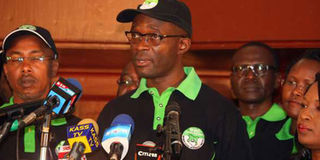Free, fair elections is a shared task

Independent Electoral and Boundaries Commission (IEBC) CEO Ezra Chiloba addressing journalists at Lilian Towers in Nairobi on January 15, 2017. IEBC should reach out to the 36,000 voters who appear in their register as persons without biometrics. PHOTO | EVANS HABIL | NATION MEDIA GROUP
What you need to know:
- The Independent Electoral and Boundaries Commission (IEBC) should start the clean-up of the register by purging the voters list using that of the officially deceased persons.
- Naturally, the security provided to the polling stations in question will need to be more pronounced.
It is said that: “Election Day is still the one day when we strive to give equal voice to every eligible voter; the day when the woman working in the market stall has as much of a say as any wealthy banker, and the illiterate menial labourer has a voice that speaks as eloquently as any university professor.
“It is our shared responsibility to strive for processes and systems that ensure that every voter is given the opportunity to make their will known, and that every vote is counted.”
This is the core business on voting day — the facilitation of the capturing of the voices of all interested and eligible voters and ensuring that their voices are heard.
What this generally means is that each voter must be allowed to cast their ballot, their ballot must be ‘heard’ (that is, be counted as cast) and the ‘voice’ must not be diluted or drowned by illegitimate voices from illegitimate ‘voters’.
This is the irreducible minimum and thus all laws, regulations, processes and procedures must be defined to facilitate this and in that order.
The Opposition has, indeed, raised reservations on how voting happens in polling stations.
The nature of our politics is that it’s ethnicity-driven and, therefore, polling stations located in areas with a homogenous ethnic make-up — especially those that are in regions that support a major presidential candidate — are considered high-risk areas for voter fraud in the form of “ballot stuffing” to occur.
In order for this to happen, it usually requires collusion between polling staff, candidates’ agents and voters to ‘vote’ for those who did not show up for voting on that day.
This concern is not just that of the political class but was also captured by the Kriegler commission in its report on the disputed 2007 General Election as it concluded that it was a “clear indication of biased recruitment compounded by inadequate training and supervision”.
This act drowns the ‘voices’ of all legitimate voters everywhere and must be addressed. How, then, do we cure this mischief?
ADVICE
I propose a strategy that will foremost ensure that the register is credible on voting day.
Key among the concerns of the political class is that the deceased will “vote”. Why not remove them?
In Kenya, the authority on this data is the registrar of births and deaths.
First, the Independent Electoral and Boundaries Commission (IEBC) should start the clean-up of the register by purging the voters list using that of the officially deceased persons.
Second, since not all deceased citizens are recorded by the registrar as having died, the next stage should involve the citizenry.
Voters are not meant to be passive stakeholders during the election, who only consume information and their interaction with the system is limited to texting their identification number to a short code with a view to getting a response about themselves and, consequently, seek intervention on their own behalf.
Voters are, in addition to requesting their inclusion in polling stations that they had stated a desire to vote in, requesting the IEBC to update their particulars.
During the inspection of the roll of registered voters, they are expected to object to the inclusion of a voter in the list for reasons that they are deceased or any other legitimate reason.
Third, the IEBC should reach out to the 36,000 voters who appear in their register as persons without biometrics.
Since the IEBC also collects the telephone number of a person, this can be done by ensuring that such people are informed of their registration status.
IMPROVE SECURITY
If no contact is available or active, the IEBC should reach out to mobile phone service providers with a view to getting phone numbers of these individuals and then notify them to have their biometrics recaptured.
For “ballot stuffing” to happen at a polling station, it requires collusion with polling staff.
It’s thus important to ensure that the polling station staff is politically balanced.
Why not regulate the deployment of polling staff to determine their deployment?
To ensure that persons are not deployed in their home areas?
Naturally, the security provided to the polling stations in question will need to be more pronounced.
Secondly, all stakeholders — including political parties, independent candidates and civil society — should sit down under the chairmanship of the IEBC and participate in defining what the “complementary” system set out in law is going to be.
These discussions must clearly define all polling day operations and leave very little room for discretion.
Mr Ngumi is an election technology adviser who has given technical assistance to several election management agencies. Email: [email protected]




